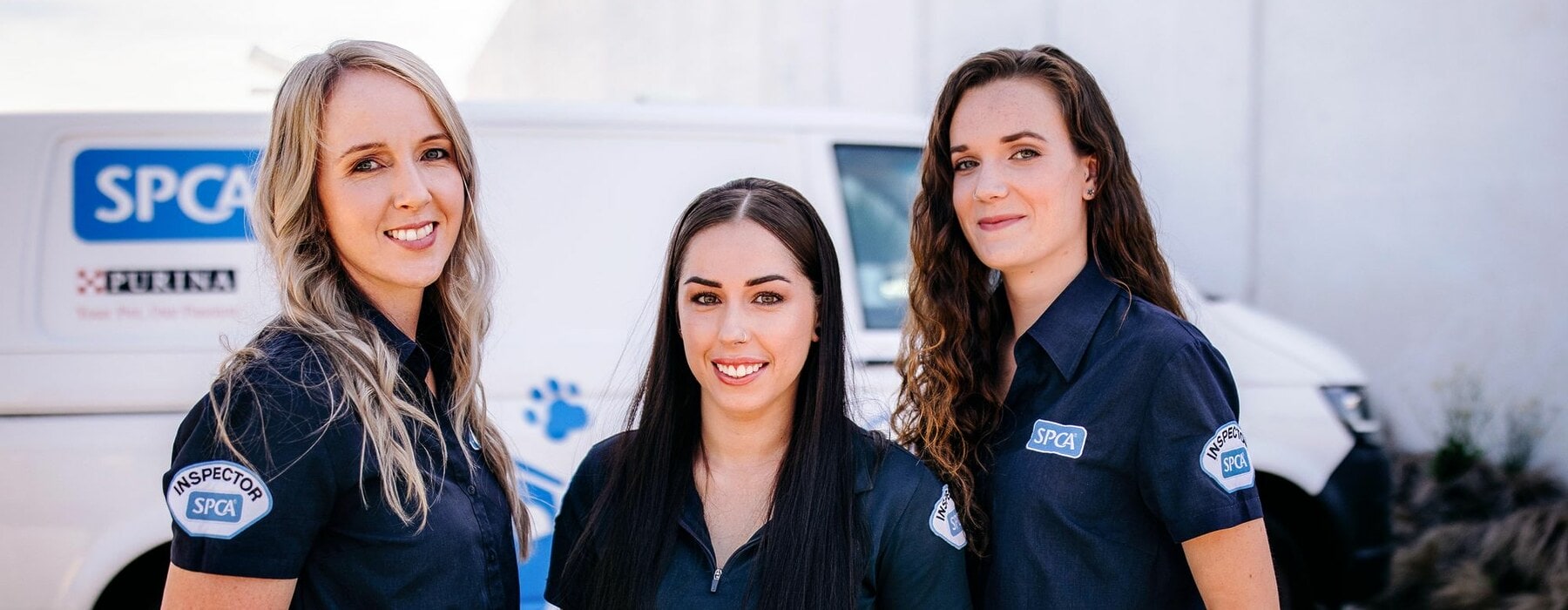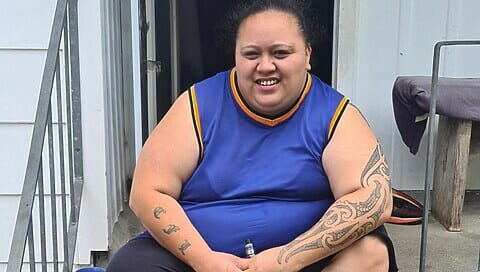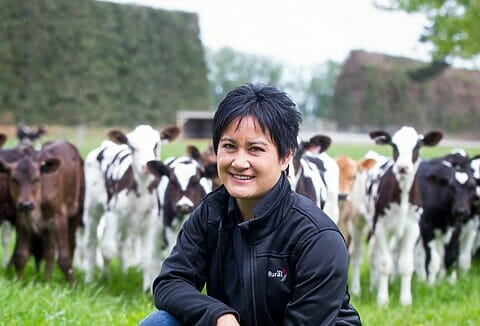Ahead of the SPCA Annual Street Appeal, three animal welfare inspectors share their stories and talk about how they keep smiling.
Thirty five thousand. That’s how many animals come through the SPCA’s doors each year, most of them with backstories of abuse, neglect and abandonment that will scramble your heart and open your tear ducts. Here’s another number: $47 million. That’s the amount the charity needs each year to keep operating. With little government funding, the SPCA’s annual appeal is critical so they can continue to help the nation’s most vulnerable animals. Ahead of the March 1-7 appeal, Sharon Stephenson spoke to three animal inspectors about what they do – and how they keep smiling.
Melissa Rush

A sense of humour and good waterproof mascara. Those are two things SPCA Animal Welfare Inspector Melissa Rush never leaves home without.
The 31 year old has been in the animal trenches for seven years: two in Whangārei and the last five in Auckland. It’s a job that sees her driving hundreds of kilometres each week, from her base in Hobsonville as far north as Mangawhai Heads, investigating complaints of abuse and neglect. As you’d expect, it’s not all fluffy kittens and cute puppies.
“Sometimes I can’t believe the things people do to animals,” says Melissa, who was born and raised on Auckland’s North Shore. “I have to admit, I’ve lost a lot of faith in humanity doing this job.”
I have to admit, I’ve lost a lot of faith in humanity doing this job
Like when she found an abandoned dog with a terrible case of mange, a skin disease that causes the hair to fall out.
“The owners had moved out and left their dog tied to a fence without food or water,” Melissa recalls. “She was lying on the ground when I found her and initially I thought she was dead, but then she raised her head and I was like, ‘How are you even alive?’ Her skin was red and raw and she screamed in pain when I touched her.”
Although the dog made a full recovery and was adopted by a loving family, the previous owners were never located.
“We spent ages looking for them and talking to the police, but they got away without paying for what they did,” says Melissa, wiping away a tear. “Years later, that story still makes me cry.”
It’s a job that can expose inspectors to a considerable amount of risk and abuse. “We’re often dealing with people who don’t want us on their property,” she explains. “We work on our own and it can be scary when you’re confronted by someone yelling abuse or threatening to hurt you. I’ve had people say to me, ‘You’re just a little blondie, what can you do to me?’”
Although inspectors receive training to deal with such situations, it can still be frightening, particularly with the rise in P consumption and mental health issues.
“When I first started out, I didn’t have to deal with many people on drugs, but now it’s quite common and they can be really unpredictable in how they treat you. But I’m pretty good at talking to people at their level and can usually talk them out of these angry situations.”
Melissa was always going to end up in this job, or one like it. When she was four she’d arrange her soft toy collection and pretend she was a vet, checking them over and writing their imagined ailments in a notebook. “There was no plan B. Working with animals was the only thing I ever wanted to do.”
After completing a Bachelor of Animal Science at Unitec, she applied for a certificate in animal welfare investigation. When a job came up at the SPCA Whangārei, Melissa packed up her life and headed north.
Melissa currently rents a flat with her partner Dave, a lab technician, who she credits with “getting me through the crap we see everyday in this job”.
“I sometimes go home and need a good cry and a cuddle, so thankfully Dave is supportive of me,” she says. “I also have a great wellness coach because my mental health is really important and this job is super high stress.”
But life isn’t without its positives. Melissa recounts the story of her first prosecution, of a gang member whose five pig dogs were living in terrible conditions.
“One dog was chained up 24/7 and they were all skin and bones, living in their own faeces. I still have photos on my phone of one of the dogs we removed, she was in a bad way but was such a special girl. Despite what her owner put her through, she recovered and was adopted into a family who gave the beautiful life she deserved. I couldn’t have asked for anything better.”
Bryana Williams
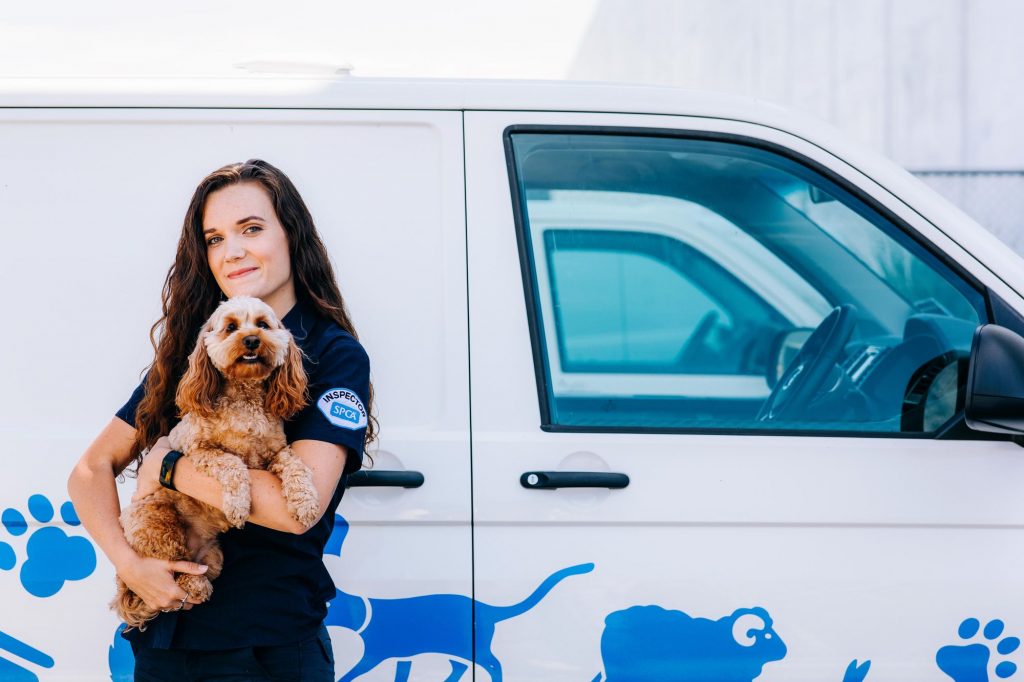
“A career in fashion would’ve been so much easier,” laughs Bryana Williams of her decision not to study fashion but instead become an SPCA Animal Welfare Inspector.
She’s been working for the Auckland branch since 2018, after completing a certificate in animal welfare inspection at Unitec. She did a year with the SPCA as a field officer, which mainly involved rescue cases, such as kittens stuck down drains. For the last two years, Bryana, 24, has been an inspector, investigating animal cruelty cases.
“Of course there are some horrible individuals out there who deliberately hurt animals, but others simply aren’t aware of how to care for an animal, so there’s a huge education component to what we do.”
There are some horrible individuals…but others simply aren’t aware of how to care for an animal, so there’s a huge education component to what we do
Such as the recent case of a dog chained up with no shelter from the burning sun.
“At the beginning, the owner told me to eff off, but when I informed him that legally he had to provide a kennel, he finally understood,” Bryana explains. “I had to issue him with a written notice and he had seven days to get a kennel, which he did.”
It’s those who wilfully neglect their animals that raise Bryana’s heckles. Like the cat who’d lost its nose to cancer, yet its owner refused to seek treatment.
“If that was my cat, I would have been in tears. But this woman didn’t care. She surrendered the cat to me and the poor thing had to be euthanised. It’s people like that who make me angry, even though I have to remain professional, calm and collected on the outside because I have a job to do.”
Bryana, who has a one-eyed SPCA cat, admits she was always the sort of child who would seek out animals to pat and loved helping out at her uncle’s farm. Law enforcement and helping the community is also a theme threaded through her family, with an uncle and cousin in the police force and another cousin who works as a paramedic.
“It’s that thing of helping those who can’t help themselves,” she says.
That’s why Bryana does this job, even though she’ll often arrive on her mother’s doorstep in floods of tears.
Despite the hardships, the SPCA is her dream job – but she’ll readily admit she’s probably only got another few years left. “Being an animal inspector can burn you out really quickly,” Bryana says.
Any future job, though, would have to involve animals. “I’d like to maybe work with Customs dogs and one day head to Bali to volunteer alongside a former colleague who works at an animal rescue centre there. We do these kinds of jobs for the animals, to be their voice because no one can speak for them.”
Brittany Weatherley
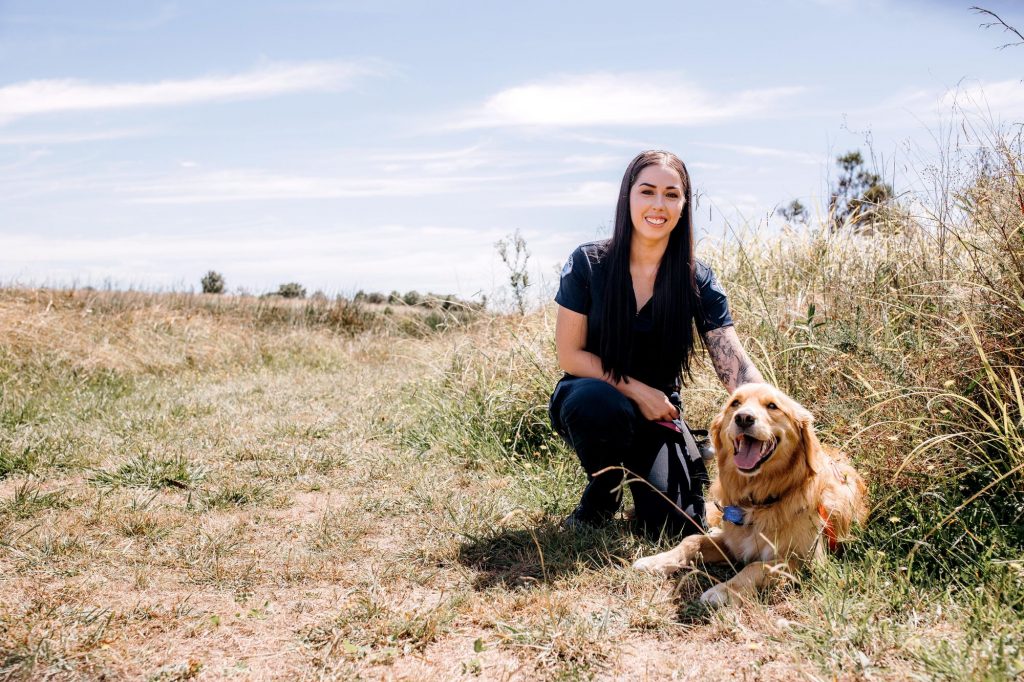
It’s 6pm when I finally get to interview SPCA Animal Welfare Inspector Brittany Weatherley. The 25 year old has had a packed day and is crawling through heavy traffic on Auckland’s Northwestern motorway when we speak.
She’s heading home to the West Auckland rental she shares with her partner Zac, their dog, two cats and six hens.
“Walking our dog on the beach after long and often upsetting days is the perfect way to de-stress,” says Brittany. “Seeing a happy animal reminds me that not every animal is living in a dark, desperate place.”
Brittany grew up with banker parents who fostered a string of SPCA animals, so it wasn’t too much of a stretch to make a career of it, training as a vet nurse and working with domestic animals.
As much as she enjoyed it, it wasn’t the goosebumps experience she was looking for.
“I wanted to work with animals who don’t have anyone to care for them, the strays and the literal underdogs; the ones who don’t have owners willing to spend money on their vet care,” she says. “That’s where I knew I could make a difference.”
In 2016, Brittany scored a job managing adoptions at the SPCA Māngere shelter, as well as recording welfare complaints in the call centre. It kickstarted her interest in inspectorate work, so she enrolled for a certificate in animal welfare inspection at Unitec and was eventually offered a permanent role as an inspector for the SPCA.
It’s a job, she says, that has exposed her to “sights that will make your stomach drop”. Like the time she investigated a complaint about two six-month old puppies suffering from mange.
“The owners had tried to treat them but it had got out of control, so they eventually locked the dogs in the crawl space under their house so no one could see them!” Brittany recalls. “Neither dog had a single scrap of fur and both were pink, inflamed and covered in open, bleeding sores. It was the worst case of mange I’d ever seen. I convinced the owners to surrender the dogs, but simply putting the soft leads around their necks caused the sores to start bleeding. The pain and discomfort those dogs were in would have been immense. The poor things were so bad they had to be euthanised, and it’s a sight I’ll never forget.”
But the flip-side – of being able to prevent the cycle of neglect with eduction – is something Brittany relishes.
“Often people simply don’t understand what their animals need, so to be able to talk to them and answer their questions is a rewarding part of the job. On one call out, I arrived at a house where a dog had just had 12 puppies and she was on a really short chain on the concrete with no shelter. I spent a long time chatting to the owners, telling them what the mother dog needed. They surrendered all the pups to the SPCA and got the mother desexed, which was great. Six months later, they called me because they were looking after a relative’s dog and asked for advice on how to care for it. To me, that’s a win, because not only did they take my advice on board, they also kept my business card so they could ring when they needed help.”
It’s understandable that when the SPCA catches flack on social media, particularly for its failure to act in certain situations, it can be hard to swallow. “We can only act within the law, which is frustrating for us sometimes too. We’d often like to do more.”
But it’s a good day in Brittany’s world when someone stops her in the supermarket or petrol station to tell her what a great job she’s doing.
“We love the support we get from the community because without them we wouldn’t hear about animal welfare issues,” she tells. “We’re certainly not in this job for the money but we do it because of our passion for these furry creatures that need us to be their voice.”

